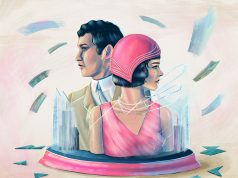Having had an impressive career to date and still a promising future to come, film editor Ahmed Hafez talks editing. The genius behind the awe-inspiring The Blue Elephant, Torab Al Mas, Hepta, El Sheikh Jackson, and series including Paranormal and Every Week Has A Friday brought us up to speed on everything to do with the film editing field in Egypt.
By Mariam Elhamy
How did you get a foothold in the world of video and film editing?
It wasn’t by coincidence. My dad used to work in the advertising agency Wekalet El Ahram, so I went there to learn graphics when I was in middle school. A couple of weeks after I started, I came across the post-production room and heard the sounds of the frames being played so I snuck in to watch and learn. Ahmed Hafez
I was immediately fascinated by the relationship between sound and image, and that’s when I decided to learn editing. I used to sit and watch every day until one time an editor couldn’t come and they gave me a shot at a documentary. They were astounded with the results because I was just a kid and this gave me some confidence to resolve that I want to do this for a living.
Bit-by-bit I started getting clips and ads. I worked alongside Hadi El Bagoury on many videos, advertisements, music videos and his first film.
45 Days was the first film I got from director Ahmed Yousry, he insisted that I work with him although the production company rejected the idea because I didn’t work as an assistant editor. Esaad Younis was the producer, she was the one who decided she wanted fresh blood and a young talent, so they gave me a shot and the film turned out really well for its time.
Was there any particular film that really kick-started your career?
I did 45 Days when I was 21 years old, starring Ahmed El Fishawy and Ezzat Abou Aouf. Ahmed El Fishawy was a dear friend of mine at the time. He recommended me to Sandra Nashaat who needed someone for her film The Hostage. It was a dream to work with someone as big as Sandra Nashaat so early on in my career. Ahmed Hafez
Film editing is critical to the success of any work, how closely do you need to collaborate with the director, DOP, scriptwriter and other film crew?
The editor and the director are like a married couple. They sit alone together in a room for months and sometimes even more than a year to work on a film. They might agree on things and everything works out magically but they also have differences. They come up with many options but in the end, the upper hand and the final say is always up to the director.
Thankfully everyone I’ve worked with so far has given me the space to express my own style so I get to have good input in my projects. As for the DOP, the rest of the crew and the cast, they always go back to the editor and ask about their work because the editor does the cuts and knows how to focus on bringing out the best of their work.
What are the challenges involved?
Every day there’s a new challenge. You want to create a scene that tells the story right. Every scene as a standalone might be done well, but as a whole when you put it all together it might not match the harmony of the rest of the scenes. Subsequently, you have to change it or rearrange the structure to make it work.
It’s very stressful to try to tailor your mind to each different project and to do something that is new and different from what you’ve done before. Editing is like art, not everyone has to agree on whether they like it but you try to make something that most people would like. Ahmed Hafez
The final version or draft of the script is always written in the editor’s room with the help of the scriptwriter, the director and the producer. We cut lines, prolong scenes, add pauses and play with music or voice over. Any comment said in the editor’s room is free money, always appreciated and taken into consideration.
Do you have a consistent approach to editing, or is there a need to be flexible according to the genre of the material?
First, I watch all of the material, all the takes and I put marks, could be a pause, a reaction, or a certain word. After I do the selection, I try to minimize and put together all the picks that I like.
Cuts are generally done in a way that the audience can’t tell when they happen, but a good editor knows when not to cut scenes and let it flow as one piece.
How have new developments in technology changed the way you work?
Technological developments help me the most in what I do. When I first started, I started on linear montage, a traditional tape-based editing system. Today, there’s digital montage, meaning that I can do several options by saving different copies of the same scene. We had 24 drafts by the end of The Blue Elephant! Ahmed Hafez
Technology also made music and sound effects become a part of montage, as well as color correction and filters, which can totally alter the mood or feel of a scene.
Young people today can make and montage a film using just their phone. This definitely creates a higher challenge but also pushes you to always stay updated.
Which films have you most enjoyed working on?
Every film is special in its own way with its own memories, but the films I really enjoyed working on the most were Torab Al Mas, The Blue Elephant, and Hepta. I really like working with Marwan Hamed, Hadi El Bagoury and I can’t forget my first film with Sandra Nashaat. I worked with a Turkish director on a Turkish/Syrian film called Mesafer, which I cherish very much.
What attributes would you consider essential for anyone considering a career in this field?
Anyone who wants to work in montage needs to have incredible patience, storytelling skills, sense and most importantly teamwork. They need not to care about fame because people are not necessarily going to know them.
They have to know that they’re going to be a small part in a very big machine. Only those working in the field understand and appreciate the amount of effort that we put in.
Are there any film editors whose work you admire? Which films in particular and why?
Walter Murch who did The Godfather. Tom Cross who did Whiplash and La La Land; I love watching his work and I learn a lot from him. Being a strong storyteller, he always has something different to show. Locally, I really learned a lot from Khaled Marei.
Quickfire round:
Memorable books read this year?
Save the Cat! It has to do with script writing, scenario, plot and film casting.
Time for hobbies?
Squash or kite surfing whenever I have time. Ahmed Hafez
Comfort food?
Molokheya, Macarona Bechamel and seafood.
Best way to relax?
The sea and any greenery. Ahmed Hafez
Most productive time of day?
Early morning. The first 5 hours in the day from 7 am to 1 pm are my most productive hours.
Favorite holiday location?
El Gouna, Alexandria in winter and Italy.








